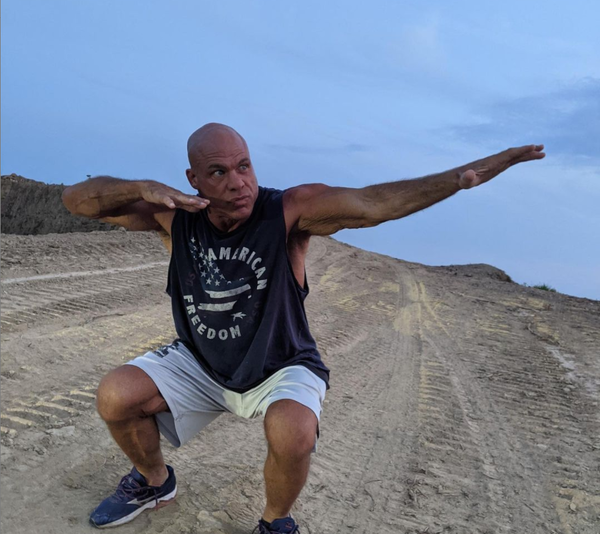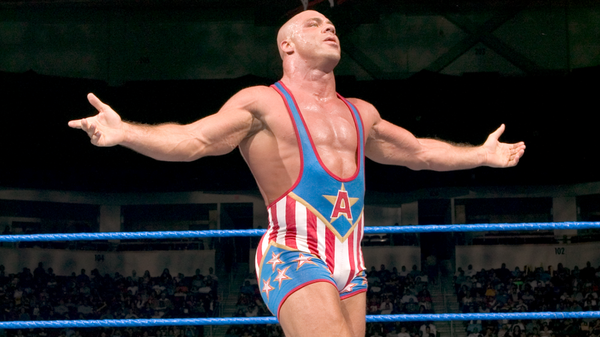Very few athletes have redefined the limits of human endurance in the way Kurt Angle did at the 1996 Olympics. The American wrestler’s story was nothing ordinary: competing despite a broken neck and disregarding the doctors’ opinions. Kurt’s extraordinary Olympic gold win while battling a severe injury shows his willingness to endure immense pain and risk his life for glory. He jeopardized his life in every fight, driven by a strong and insistent will to win.
Watch What’s Trending Now!
Angle’s story is not just about his athletic triumph; it is a testament to his selfless contribution. When the injection effects faded after each match, the sharply acute pain resurged, thereby a powerful reminder of what he got physically and metaphorically speaking from his dream. Nevertheless, through his faith and strong will, Angle triumphed in his career, thus becoming one of the most tenacious humans in sports history, sharing his tough journey of pain, glory, and success in a recent interview.
ADVERTISEMENT
Article continues below this ad
Kurt Angle’s unstoppable drive broke boundaries
In an interview with eWrestlingNews.com, American retired professional wrestler Kurt Angle shed light on the time when he even risked his life. During the first round of the Olympics trial, he got injured and broke his neck. Despite such a serious injury, Angle didn’t stop or rest but went ahead. He remembers what all the doctors said that time: “It came down to straight-up bravery. I was willing to sacrifice my body and possibly my life to wrestle. I was told by doctors that I couldn’t wrestle and that if I land on my head again, I would be paralyzed or even dead.” But to everyone’s surprise, a miracle happened. He stated, “But I found a doctor that was able to help me get through the Olympic trials and the Olympic games.” Angle shows the sheer determination and courage of athletes who face tremendous odds to chase their dreams.
He continues and describes the idea of a doctor and how he helped him to fight in such severe pain. He said, “He came up with this idea of shooting 12 different shots of Novocaine into my neck five minutes before each one of my matches. He said you’re not going to feel any pain. So you’re going to forget your neck is broken. You’ll be fine.” Novocaine, a local anesthetic, is generally used to block pain in minor surgeries, yet in this scenario, it became the cornerstone to competing at the highest level. The usage of these drugs often raises ethical questions about the balance between performance and long-term health risks.
ADVERTISEMENT
Article continues below this ad

However, Novocaine shots helped bring down the pain, but there were harsh consequences of using them. The doctor told Kurt Angle, “But an hour after the match is over, you’re going to be in excruciating pain. Because the Novocaine is going to wear off and you’re going to be hurting pretty badly.” This takes a toll on athletes’ health, and wrestling, often described as one of the most grueling Olympic sports, demands exceptional physicality.
What’s your perspective on:
Did Kurt Angle's Olympic triumph justify risking his life, or was it a reckless decision?
Have an interesting take?
The doctor asked Angle if he still wanted to do that, and Angle said, “Yeah, let’s do it. And it worked. It worked for me. I won the Olympic trials, and we did the same thing at the Olympics, and I won the Olympic.” Angle’s account of shooting up with 12 doses of Novocaine before each fight adds a terrifying dimension to the project of getting his Olympic gold. This could even have taken up his life, but Kurt Angle was brave enough to make that decision for himself and America. He sacrificed for the glory, legacy, and success.
Angle’s triumph through sacrifice: pain, glory, and legacy
According to doctors, Kurt Angle’s vertebrae had severe damage. Last year Angle appeared on The Joe Rogan Experience podcast, and he said, “I didn’t have a choice; it was no guarantee I was going to make the Olympic team in 2000 or 2004; this is my one time. This is my one shot.” Though he won the 1996 Olympics, it came at the cost of a lot of pain, uncertainty for the future, and whatnot.

ADVERTISEMENT
Article continues below this ad
Later in 2003, Angle again got injured in his neck during WrestleMania XIX with Brock Lesnar in March 2003. This time, Angle’s four vertebrae got fractured, and he lost the face-off to Lesnar, despite being on the verge of winning, because he was not able to feel his arm. Though he survived the 1996 injury and won the Olympics gold, this took a toll on him, and later, on April 11, 2003, he underwent neck surgery.
In between these two injuries, Kurt Angle won many titles and medals; a few of them are USA Junior Freestyle Champion in 1987, USA Senior Freestyle Champion in 1995 and 1996, and the USA Wrestling Hall of Fame (i.e., Class of 2001). What do you think about Kurt Angle’s sacrifice of his career? Despite winning the Olympics at a high risk, Kurt Angle has not even been listed in the top 100 wrestlers by the wrestling community. Do tell us in the comment section below.
ADVERTISEMENT
ADVERTISEMENT
ADVERTISEMENT
ADVERTISEMENT





Did Kurt Angle's Olympic triumph justify risking his life, or was it a reckless decision?